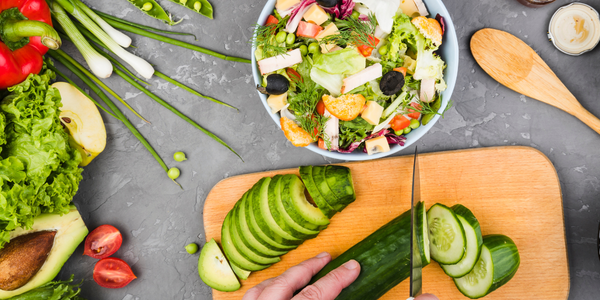How to Lose Belly Fat Naturally: Combining Diet and Exercise for Optimal Results
Introduction
When it comes to losing belly fat, it's important to understand that you can't target fat loss in specific areas of your body alone. Fat loss occurs throughout the body when you create a calorie deficit through exercise and dietary changes. By adopting a holistic approach to help reduce fat, you can achieve complete body fat reduction, including your belly area. Belly fat, also known as visceral fat, is the fat that accumulates around your abdominal organs. It's not just a cosmetic concern; excess belly fat is associated with various health risks, including heart disease, type 2 diabetes, and certain cancers. Understanding that belly fat is part of your overall body fat is important in approaching fat loss effectively.
Causes
Several factors contribute to the accumulation of body fat, including belly fat: poor diet high in processed foods and sugar, lack of physical activity, genetics, hormonal changes (especially during menopause), stress, inadequate sleep, and age-related muscle loss.
Role of Diet
Diet plays a crucial role in fat loss, especially when targeting areas like stubborn belly fat. The key is to create a calorie deficit, meaning you consume fewer calories than your body uses. Focus on incorporating whole, unprocessed foods such as fruits, vegetables, lean proteins, and whole grains into your meals. These nutrient-dense food options provide essential vitamins and minerals while helping you feel full and satisfied, making it easier to avoid overeating. Reducing the intake of added sugars and processed foods can further help manage calorie intake, as these foods are often high in calories but low in nutritional value. In a study spanning over 30 years, a higher intake of added sugars was associated with a weight gain of 2.3 kg and a 2.2 cm increase in waist circumference (size). Additionally, it was linked to a higher risk of developing obesity and abdominal obesity. (SCIENCE DIRECT) Besides a balanced diet, staying well-hydrated is also essential, as it helps control hunger and supports overall bodily functions.
Balancing your intake of macronutrients—carbohydrates, proteins, and fats—is important for maintaining energy levels and supporting overall health. Proteins help repair and build tissues, fats provide energy, and carbohydrates are necessary for fueling daily activities. A balanced diet, combined with mindful portion control, makes it easier to maintain a calorie deficit and promotes long-term fat loss. A study found that eating portion-controlled meals helps people lose more weight and fat than self-chosen food, but it still provides the same level of satisfaction. (NIH) A recent clinical trial also found that early time-restricted eating (eTRE) was more effective for weight loss compared to eating over a longer period and helped lower diastolic blood pressure and improve mood. (JAMA)
Just remember, no single food will target belly fat specifically. The goal is to adopt consistent, healthy eating habits that contribute to a sustainable calorie deficit, supporting overall fat loss and well-being.
Role of Supplements
While supplements can support your overall health and potentially help reduce fat, they're not a magic solution for losing belly fat. Some supplements that may support fat loss include protein powders, fiber supplements, green tea extract, and apple cider vinegar (ACV). Protein powders can help with muscle maintenance during fat loss and increase feelings of fullness. Fiber supplements may aid in feeling full and reducing overall calorie intake. Green tea extract contains compounds that may slightly boost metabolism and fat oxidation. Some studies suggest that ACV may help with weight loss by promoting feelings of fullness and potentially improving insulin sensitivity. ACV is often consumed diluted in water before meals. However, research on its direct effects on belly fat is limited, and it should not be seen as a standalone solution. One should always consult a healthcare professional before starting any new supplement regimen. Additionally, it's important to note that while these supplements may offer some benefits, they are not replacements for a balanced diet and regular exercise. Their effects are generally modest, and they work best when combined with a healthy lifestyle.
Exercise
Regular physical activity is crucial for overall fat loss, which includes a reduction in belly fat. A combination of cardio and strength training is the most effective approach that one can have. Aim for at least 150 minutes of moderate-intensity or 75 minutes of high-intensity cardio per week, include resistance exercises at least 2-3 times per week, and consider incorporating High-Intensity Interval Training (HIIT) into your routine. According to research, high-intensity exercise significantly reduced visceral fat and improved thigh muscle quality, while moderate-intensity exercise or no exercise had no effect. (NIH)
Lifestyle Changes
Alongside diet and exercise, certain lifestyle changes also support overall fat loss. These include managing stress, getting adequate sleep, limiting alcohol consumption, and staying active throughout the day.
Consistency
For effective fat loss, including belly fat, staying consistent is key. Sustainable fat loss takes time and requires a long-term commitment to healthy eating habits and regular physical activity. Instead of relying on crash diets or extreme exercise regimens, focus on making small, sustainable changes to your diet and lifestyle. Gradually increase your physical activity levels and make healthier food choices.
Final Thoughts
In conclusion, while you can't specifically target belly fat loss, adopting a holistic approach through a balanced diet, regular exercise, and healthy lifestyle habits will help you effectively lose body fat, including around your midsection. Combining exercise with diet can lead to a significantly larger reduction in subcutaneous fat compared to diet alone. (BMC)
All you need to know is that fat loss doesn't happen overnight and there’s no such thing as a magic fat-burning pill. Be patient with your body, stay consistent, and celebrate the small victories along your health journey. Remember, the goal is to see an overall health improvement and not just lose belly fat.




























